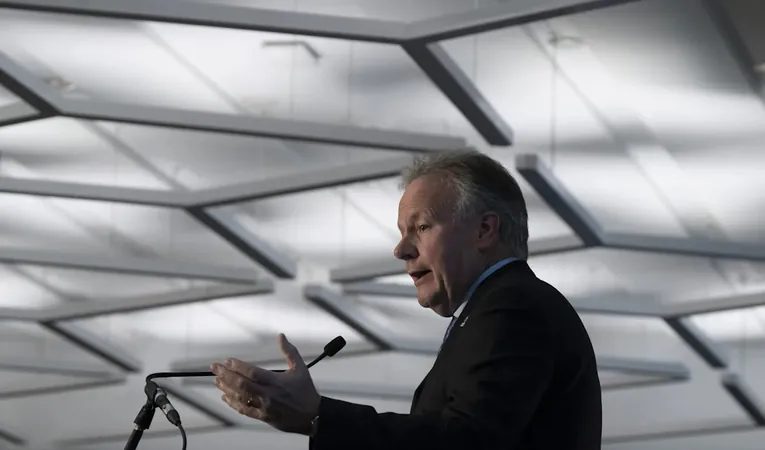
U.S. Tariffs: The Economic Tornado That Could Cost $40 Trillion, Warns Stephen Poloz
2025-09-19
Author: Noah
U.S. Tariffs Could Wreak Havoc on Global Income
In a startling announcement, Stephen Poloz, the former governor of the Bank of Canada, has declared that the tariffs imposed by the U.S. could lead to what he describes as the "greatest intentional destruction of income ever." With estimates suggesting a potential tariff level of 10%, Poloz warns that this could dramatically slash global income by nearly two percentage points.
A Jaw-Dropping Economic Impact
At first glance, it may not sound significant, but Poloz's figures are staggering: a loss of $2 trillion this year alone, accumulating to a jaw-dropping $40 trillion over the next decade. He likens the impact of these tariffs to "throwing sand into the gas tank of a finely tuned Camaro," underscoring the potential chaos they could unleash.
The Ripple Effect of Retaliation
Poloz cautions that these figures hinge on the assumption that other countries won't retaliate. He emphasizes, "Like in any war, if you retaliate, you can easily double your losses." His comments came during the opening session of an artificial intelligence symposium in Toronto, a timely backdrop amid escalating trade tensions that are shaping the future of global economics.
A Year of Trade Turmoil and Possible Recession
As tariffs and trade disputes dominate headlines, the economic landscape is dimming. There are discussions swirling around the possibility of a recession and significant shifts in the world order. Poloz calls for a realistic understanding of these trends, attributing them more to economic fundamentals than to politics, despite alluding to U.S. President Donald Trump’s pivotal role.
History Repeats: Lessons from Previous Revolutions
Drawing parallels from past economic upheavals, Poloz notes that history tends to repeat itself, particularly during industrial revolutions. He points to the cyclical nature of economics, stating that each revolution has historically been linked to major stock market crashes, income disparities, and eventual political and social turmoil.
Embracing Change: The Path Forward
Looking ahead, Poloz suggests a new strategy to mitigate the looming repercussions of tariffs. He advocates for reducing interprovincial trade barriers, a move that the Canadian federal government has begun to address. Additionally, he emphasizes the importance of embracing artificial intelligence, even as some like Julian Birkinshaw express skepticism about AI’s overall revolutionary impact on established sectors.
A Call for Vigilance and Pragmatism
While Birkinshaw acknowledges the transformative potential of AI, he urges companies to remain cautious and pragmatic, avoiding complacency. Poloz echoes this sentiment, asserting that businesses and governments must adapt and prepare for a tumultuous economic landscape that could reshape our world as we know it.









 Brasil (PT)
Brasil (PT)
 Canada (EN)
Canada (EN)
 Chile (ES)
Chile (ES)
 Česko (CS)
Česko (CS)
 대한민국 (KO)
대한민국 (KO)
 España (ES)
España (ES)
 France (FR)
France (FR)
 Hong Kong (EN)
Hong Kong (EN)
 Italia (IT)
Italia (IT)
 日本 (JA)
日本 (JA)
 Magyarország (HU)
Magyarország (HU)
 Norge (NO)
Norge (NO)
 Polska (PL)
Polska (PL)
 Schweiz (DE)
Schweiz (DE)
 Singapore (EN)
Singapore (EN)
 Sverige (SV)
Sverige (SV)
 Suomi (FI)
Suomi (FI)
 Türkiye (TR)
Türkiye (TR)
 الإمارات العربية المتحدة (AR)
الإمارات العربية المتحدة (AR)